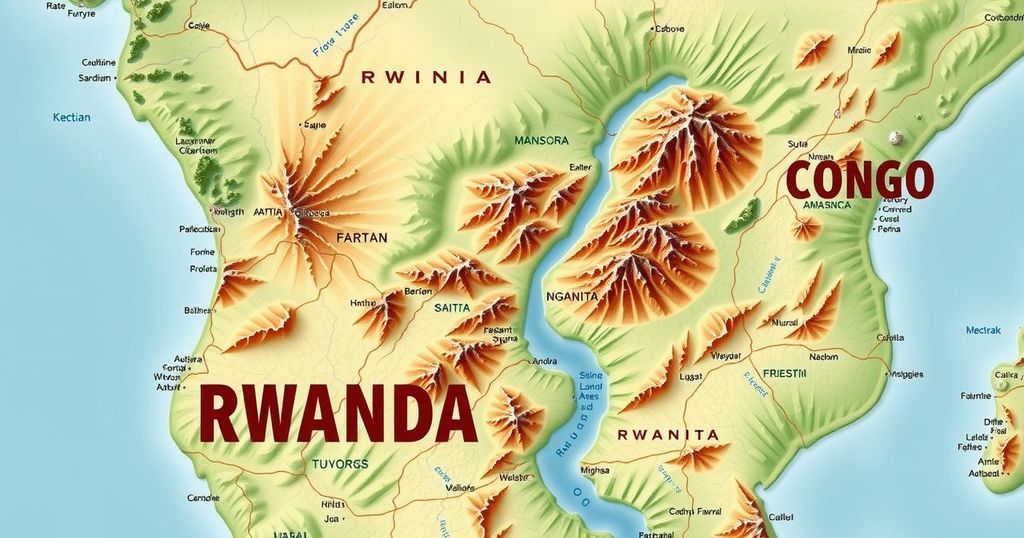This article critiques U.S. and U.K. sanctions on Rwanda amid the Congo conflict, arguing they misidentify the aggressor and overlook the complexities of the M23 insurgency. It highlights the necessity for a reformed approach to achieve peace and security in Africa’s Great Lakes region, including a new regime in Kinshasa and dismantling ineffective U.N. efforts.
The recent conflict in eastern Congo has drawn attention to the actions taken by the United States and the United Kingdom, who imposed sanctions on Rwanda’s defense minister and the spokesperson for the M23 insurgent group in Congo. This decision has been described as counterproductive, akin to blaming a victim for defending themselves against abuse. The M23 insurgency is largely a result of the Congolese government’s failure to honor prior peace agreements and President Felix Tshisekedi’s encouragement of ethnic tensions, alongside compromising ties with groups linked to the Rwandan genocide.
The M23 group is predominantly Congolese, although it consists of members who share ethnicity with some individuals in Rwanda. These members represent a diverse array of ethnicities from Congo’s North and South Kivu regions. Secretary of State Marco Rubio’s policies, paralleled by those of former Secretary Antony Blinken, reflect a misguided endorsement of the State Department’s Africa Bureau, which has often disregarded the moral complexities of the situation for personal political agendas.
In addition, Rwandan forces have engaged in limited preemptive operations in Congo, having discovered substantial military caches suggesting preparations for a potential Congolese offensive against Rwanda, corroborated by voices from the Congolese regime’s proxy factions. Rubio’s actions have been perceived as misidentifying the aggressors and the victims within this situation, drawing parallel comparisons to international conflicts involving Israel and Ukraine. Simultaneously, regime-led bombings of civilians in the M23-controlled Bukavu serve as a stark reminder of this misalignment.
The narrative accusing Rwanda of resource exploitation in eastern Congo arises from misinformed diplomats and United Nations officials disconnected from regional dynamics. Based on firsthand experience in M23 territories, local business perspectives differ significantly from those of the State Department, often framing what is viewed as looting as established normalcy in trade. Economic operations, including mineral and agricultural trade, are underpinned by substantially lower taxes at borders compared to the Congolese government’s demands.
Had sanctions proven effective in halting atrocities, many Congolese lives could have been spared. Rubber-stamping the current Congolese administration and its expansionist Chinese ties signals the lack of viable options for groups like M23, as any return to past governance poses an existential risk for Rwanda. The pathways to restoring human rights and security in Congo necessitate a proactive approach that includes navigating towards Kinshasa with a strategy to facilitate regime change and constitutional reform.
Although sanctions are in place to mask previous miscalculations, a transformative regime in Kinshasa is essential to preventing historical repeats. Northern and Southern Kivu might resemble a status similar to Iraqi Kurdistan if fundamental changes occur. The U.N. needs to reevaluate its approach, disarming ineffective peacekeeping operations while Rubio must advocate for assessing Burundi’s role in terrorism and sanctioning the Congolese leadership via the Magnitsky Act. Only through these measures can peace in Africa’s Great Lakes region be envisioned.
In summary, the United States’ recent sanctions against Rwandan officials miss the mark, as they fail to address the underlying complexities of Congo’s political and social landscape. The M23 insurgency reflects deep-seated grievances stemming from governmental failures, not mere external aggression. A reevaluation of U.S. foreign policy and sanctions is critical to ensuring lasting peace and stability in the Great Lakes region. Ultimately, meaningful change will require careful attention to local dynamics and a commitment to human rights.
Original Source: www.aei.org






